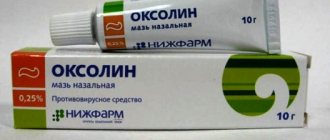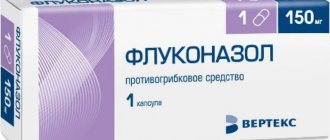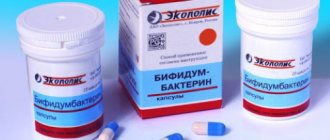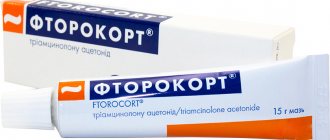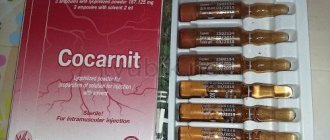Indap is a diuretic drug produced on the basis of sulfonamide.
The drug belongs to the category of thiazide diuretics.
It has the pharmacological property of dissolving sodium salts in the cortical part of the kidneys, stimulating the functioning of this organ of the excretory system.
The main therapeutic effect of lowering blood pressure is achieved through the prolonged removal of all excess fluid in the body of a patient with hypertension.
Letters from our readers
Topic: Grandma's blood pressure has returned to normal!
From: Christina ( [email protected] )
To: Administration otgipertonii.ru
Christina, Moscow
My grandmother’s hypertension is hereditary - most likely, I will have the same problems as I get older.
I accidentally found an article on the Internet that literally saved my grandmother. She was tormented by headaches and had a repeated crisis. I bought the course and monitored the correct treatment.
After 6 weeks she even started talking differently. She said that her head no longer hurts, but she still takes pills for blood pressure. I am sending a link to the article
Indications for use
The drug is indicated for patients who, based on the results of a comprehensive examination of the cardiovascular system, have been diagnosed with hypertension or essential hypertension. The medication is used in the systemic treatment of high blood pressure, as well as for the purpose of quickly relieving a hypertensive crisis.
The drug is especially useful for patients with stages 3 and 4 arterial hypertension, as it helps to avoid the onset of such severe complications of high blood pressure as myocardial infarction, as well as ischemic stroke of the brain.
We recommend reading: Specific complications of hypertension and hypertension
Effect on blood pressure
Indap tablets belong to the category of long-acting diuretics. They allow you to remove excess fluid from the patient’s body in small portions without injuring the kidneys, as well as other organs that lose large amounts of moisture. Moreover, the effect persists for a long period of time.
Due to the removal of fluid through the kidneys, spasm of blood vessels is relieved, blood pressure decreases, and the patient’s well-being returns to normal limits. It has an excellent therapeutic effect in the treatment of patients with hypertension undergoing hemodialysis.
Don't tolerate high blood pressure
Now hypertension can be cured by restoring blood vessels...
>
Indap for the treatment of arterial hypertension
Indap belongs to the category of diuretics and is available in capsule form. It has many advantages, but is not suitable for some patients. The drug has a positive effect on kidney function. Long-term use helps reduce the risk of stroke.
The drug reduces the mass index of the left ventricle, thereby reducing the risk of death due to problems with the cardiac and vascular system.
A diuretic with antihypertensive properties is prescribed for hypertension, including that caused by kidney problems. As part of complex therapy, it is used to treat heart failure. For other pathologies the medicine is not used.
The tablets should be taken in the morning, before or after breakfast. Capsules should be swallowed whole and should not be broken or crushed. Wash down with regular boiled water in sufficient volume. The standard dose per day is 2.5 mg - one capsule.
You can increase the dosage after a few months if there is a visible decrease in blood pressure. Otherwise, similar medications are prescribed.
Contraindications for use:
- Hypokalemia.
- Anuria.
- Kidney pathologies.
- Liver dysfunction.
- Uncompensated form of diabetes mellitus with ketoacidosis.
- Acute circulatory disorder in the brain.
- Lactose intolerance.
Reviews from patients show that the drug is well tolerated and side effects rarely occur. Most often they are associated with incorrectly selected dosage.
There is no difference between the drug Indap and Indapamide. Two medications are intended for the treatment of hypertension, have the same indications, contraindications, side effects, and have the same active ingredient. Indap, like its analogues, is used in the general treatment of arterial hypertension and to eliminate edema.
Release form
The drug Indap is produced by the manufacturer in the form of capsules that have a dense structure. They are made from edible gelatin. The capsule body is white, and the lid has a blue tint. Inside it is a white powder that has no specific odor.
The form of release of the medicine is convenient for daily use, since it passes unhindered through the esophagus, and the dissolution of the gelatinous body occurs only in the intestines, which eliminates irritation of the sensitive mucous membrane of the stomach.
Contraindications
The drug Indap has contraindications that must be taken into account when taking the drug:
- disruption of cerebral blood flow;
- period of pregnancy or breastfeeding;
- anuria;
- medications that increase the QT interval are taken in parallel;
- galactosemia;
- problems absorbing glucose or galactose;
- liver, kidney failure;
- the body does not tolerate lactose;
- sensitivity to the main active ingredient, as well as excipients.
Indap can be used with caution in the following situations:
- hyperuricemia (especially if it is accompanied by gout and urate nephrolithiasis);
- heart failure (chronic form);
- prolonged QT interval;
- phase of decompensation of diabetes mellitus;
- ascites;
- hyperparathyroidism;
- IHD;
- problems with water and electrolyte metabolism, including hyponatremia.
If the patient has no contraindications to the drug, it may nevertheless cause certain side effects:
- when the central nervous system is damaged, weakness, attacks of vertigo (dizziness), fatigue, irritability and an upset emotional state sometimes appear. In addition, sleep problems may occur;
- attacks of nausea or vomiting, diarrhea and dry mucous membranes may occur;
- the impact on the respiratory and sensory organs is expressed in vision problems (up to conjunctivitis), the occurrence of rhinitis, sinusitis and pharyngitis;
- sometimes there are heart problems - arrhythmia, irregular heartbeat, low blood pressure;
- from the urinary and kidney systems - nocturia, polyuria;
- itching or hemorrhagic vasculitis may appear on the skin;
- Pancreatitis, paresthesia of the extremities and exacerbation of lupus erythematosus develop extremely rarely;
- Among other side effects, patients identify flu-like symptoms, decreased libido, and sweating.
Children and adolescents under 18 years of age are strictly not recommended to take the drug, since no relevant studies have been conducted on the effect of Indap on the children's body.
Compound
The chemical components of the medicine are divided into main ones - in the form of an active substance and auxiliary ones, which ensure the transport of the medicine itself and its breakdown within the patient’s digestive system. The main component of Indap is indapamide with a concentration of 2.5 mg in each capsule. Auxiliary elements include magnesium stearate, gelatin, indigo carmine, silicon dioxide, starch obtained from processing corn grains, crystallized cellulose.
Acripamide, Indapsan and Arifon
Enter your pressure
130
on
90
Search in progress Not found
A
Kripamide is a substitute for Indap, a diuretic drug, the main component is indapamide, the release form is capsules and tablets. At what pressure is it prescribed? Recommended for second and third degree hypertension. The standard dose is 1.25-2.5 mg, best taken in the morning.
In the absence of the required effect, which is not observed within 1-2 months of treatment, it is advisable to add a medicine with a different mechanism of action to the therapy. For example, Veroshpiron (active substance spirolactone) or Enap, Lisinopril, etc.
It is not advisable to increase the dose of Acripamide, as adverse reactions are detected. Most often, patients complain:
- Nausea, vomiting, pain in the abdomen.
- Decreased appetite, dry mouth.
- Asthenia, anxiety and irritability.
- Increased heart rate, orthostatic hypotension.
- Allergic reactions - rash, hives, spots on the skin.
The drug has the same contraindications as Indap. Sold in a pharmacy without a doctor's prescription, the cost ranges from 45 to 60 rubles per pack of 30 tablets with a dosage of 2.5 mg.
Indapsan is one of the cheapest analogues of Indapamide and provides a hypotensive effect. The pharmacological properties resemble the action of the thiazide group of diuretics. The drug in the form of a non-extended form is taken at 1.25-2.5 mg per day. If there is insufficient effectiveness, the treatment regimen is supplemented with other medications.
It should not be prescribed for organic intolerance, severe renal failure, acute disturbance of blood circulation in the brain, or uncompensated diabetes mellitus.
Arifon can be prescribed by a doctor if for some reason Indap did not give the desired result, or the patient has contraindications to taking it. The product is available in tablets, Arifon retard in a prolonged form - capsules. Prescribed for essential hypertension.
It should not be prescribed if there is a disorder of the renal system, anuria, encephalopathy, intolerance to the substance indapamide, or against the background of a violation of the water and electrolyte balance in the body.
Instructions for use:
- Initially, 1.25 mg is prescribed.
- Gradually increase to 2.5 mg.
- Drink in the morning with water.
As with other drugs, if failure is observed, the pressure is still high and does not decrease, the dose is not increased. It is necessary to add other drugs to the therapy algorithm.
Arifon is sold by prescription. The cost of the drug is 300-400 rubles.
Price
The average cost of the drug Indap is in the range of 200-220 rubles for 1 package, which contains 30 capsules with the active ingredient. It is worth noting that the owner of the pharmacy who retails the medicine independently determines the final price of the medicine.
The region in which the pharmacy is located and the city district have a great influence on pricing. If we consider Indap on the basis of price-quality ratio, then the medication can be safely classified as an affordable, high-quality and effective drug for hypertension.
We recommend reading: New generation blood pressure medications
Pharmacological effect
Indap has a hypotensive effect. Moreover, in terms of pharmacological action, it is similar to thiazide-type diuretics, since when taken, the absorption of sodium ions in the loop of Geile changes, and they are excreted from the body in the urine to a greater extent. Chloride, magnesium and potassium ions are also removed. Calcium channels are selectively blocked, which increases the elasticity of the vessel walls.
The drug can be taken by those diagnosed with diabetes mellitus, since the active component does not affect the fat and glucose composition of the blood. Indap reduces the susceptibility of the walls of capillaries and blood vessels to the influence of norepinephrine.
When taking Indap, the rate of formation of free radical particles decreases. If the active substance enters the body in excess, pronounced diuresis may occur without affecting the level of pressure reduction. Typically, the effect of regular use is achieved after 14 days.
Instructions for use
According to the instructions for use, Indap tablets are prescribed as 1 capsule, which is taken orally no more than once a day. It is advisable that the patient takes the pills at the same time in the morning. This will ensure better absorption of the drug, as well as a continuous therapeutic effect of the active substance. Capsules are strictly prohibited from opening or chewing. Take the drug with a glass of water at room temperature.
Instructions for use of Indapa indicate that taking higher doses does not bring an enhanced antihypertensive effect, but only becomes a cause of drug overdose. At the same time, the frequency of the urge to urinate sharply increases, which provokes the leaching of large amounts of potassium, magnesium, and sodium salts from the body.
Working blood pressure is different for each person. In addition, the patient’s age, body weight, lifestyle, and type of activity have a great influence. The drug is indicated for use if the patient’s blood pressure is 140 per 100 tonometer units or higher, and the patient’s health has all the signs of high blood pressure.
The duration of therapy is determined solely by the cardiologist who is seeing the patient. The best therapeutic effect is achieved if Indap is taken after the cause of the development of hypertension has been established and measures have been taken to eliminate it.
special instructions
There are certain categories of patients to whom Indap is prescribed with extreme caution. The patient's health status should be closely monitored by the attending physician.
Special instructions for the use of the drug apply to the following patients:
- elderly people (patients over 75 years of age must have healthy kidneys, and the creatinine level must be within the normal range according to age-related changes, otherwise the medication should not be prescribed);
- dysfunction of the liver associated with low quality of filtration of toxic substances entering the body from the external environment, as well as those formed as a result of metabolic processes;
- renal failure (if the disease is at the initial stage of its development, then additional stimulation of the kidneys does not significantly affect the patient’s health).
Patients with these risk factors are treated with Indap only in the inpatient department of general therapy or cardiology. At the slightest deterioration in health, stop taking the drug.
Drug interactions
The combination of this drug and lithium leads to toxic effects on the kidneys.
The hypotensive effect of Indap increases significantly with concomitant use of antipsychotics and tricyclic antidepressants.
When taking Indap and ACE inhibitors simultaneously, acute renal failure or hypotension may develop.
The combination of this drug with laxatives, cardiac glycosides, tetracosactide and amphotericin can lead to hypokalemia (lack of potassium in the body).
Use by the elderly
Elderly people take Indap capsules at the same dosage as younger patients. The main thing is to maintain the normal functioning of the liver and kidney tissues. If there are serious pathologies in these organs or their filtration function is reduced, then the medication is not prescribed.
Side effects
In most cases, Indap is well tolerated and does not cause negative reactions in the body. However, clinical manifestations of side effects occur periodically. They are expressed in the following states of the body:
- nausea, gag reflex, loss of appetite;
- dry mouth, constipation;
- signs of renal and liver failure;
- allergic reaction in the form of redness of the skin, rash, itching;
- dizziness, weakness, decreased concentration caused by a possible decrease in blood pressure.
During the period of treatment with Indap, it is recommended to refrain from driving vehicles so as not to provoke an emergency. The same applies to operators of mechanical machines in production, which are a source of increased danger.
Video on the topic
Indap is far from the only diuretic prescribed for hypertension. The most famous loop diuretics are Torasemide, also known as Diuver, and Furosemide. They and other most effective diuretics are discussed in the video:
The information on the MyMedNews.ru website is for reference and general information, collected from publicly available sources and cannot serve as a basis for making a decision on the use of medications in the course of treatment.
MyMedNews.ru
And we also have
Enzistal or Festal?
Overdose
The first signs of a drug overdose appear in the form of a violation of the water-salt balance. The patient develops the following symptoms:
- spasms of the lower extremities;
- nausea and vomiting;
- drowsiness, confusion;
- allergic reaction.
It is extremely important that a person who has taken an increased dose of Indap receives first aid in the form of sorbent preparations. These include Atoxil, Smecta, White coal, Enterosgel, Activated carbon.
What happens in case of an overdose?
If the rules for taking the medication are violated, the condition of the hypertensive patient may worsen. In this case, the patient feels nausea, dizziness, drowsiness, possible urinary retention or, conversely, too frequent urges. In this case, it is necessary to perform a gastric lavage, artificially induce vomiting, and then take “Activated carbon,” which neutralizes the toxic effect of the drug. If this does not help, you need to seek medical help in a hospital, where the patient’s water and electrolyte balance will be restored.
Analogs
There are the following drugs with similar pharmacological properties, namely:
- Indapamide retard;
- Indapen;
- Ravel;
- Hemopamide;
- Lorvas.
The cardiologist determines which drug to use as an analogue of Indapa. It is not recommended to replace the drug on your own, as you may not get the expected therapeutic effect.
We recommend reading: Giperium (Hyperium) - a drug for blood pressure
Interaction with various medications
Indap should not be taken simultaneously with lithium-based drugs, as there is a high likelihood of intoxication associated with decreased renal clearance.
When taking the following medications, the therapeutic effect of the drug decreases and arrhythmia appears: Erythromycin, Pentamidine, Sultopride, Terfenadine, Vincamine, Quinidine, Bretilium.
Baclofen enhances the hypotensive properties of Indap, and NVP, glucocorticosteroids, adrenergic stimulants, and tetracosactide reduce it.
Glycosides, corticosteroids and laxatives increase the likelihood of hypokalemia. Antidepressants increase the antihypertensive capabilities of Indap.


